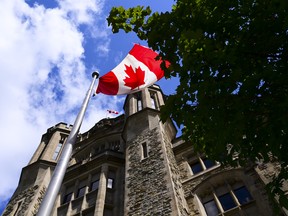Federal Tax Policy Under the Trudeau Government: A Closer Look
Introduction
The federal tax policy under the Pierre Trudeau government has been a subject of significant debate, particularly regarding its impact on Canadians. This analysis delves into key aspects such as capital gains taxes, the sales tax holiday, and broader economic implications.
Capital Gains Tax Hike: A Double-Edged Sword
The 2024 tax year witnessed a notable hike in capital gains taxes, introduced to address a perceived deficit of 0.13% among taxpayers. Critics argue that this measure disproportionately affects high-income earners with substantial investments, while the government claims it targets only 0.13% of the population annually.
However, this statistic is misleading and incomplete. The affected group each year differs significantly from previous or subsequent years, leading to a broader impact than initially perceived. Additionally, since many Canadians already own publicly traded companies, the policy affects all investors, including those with smaller portfolios.
Economist Jack Mintz estimates that approximately 4.7 million Canadians are impacted by this tax hike, representing about 15.8% of all filers based on 2021 data. In reality, nearly every Canadian is connected to corporate ownership through pension plans or direct investments, making the policy’s effects far-reaching.
The hike aims to discourage investment but risks stalling business growth and hindering Canada’s productivity. Economic analyses suggest that weak business investment contributes to a stagnation crisis, exacerbated by this tax increase.
The Sales Tax Holiday: Administrative nightmares
In December 2024, Trudeau introduced a two-month sales tax holiday, targeting small businesses affected by the tax. The initiative faced significant opposition, with over 75% of business owners deeming it costly and complex to implement.
While the holiday was meant to boost holiday spending, its administrative burden has resulted in increased logistical challenges for businesses. This policy not only fails to stimulate economic activity but also adds unnecessary stress, further straining budgets and resources.
Broader Economic Implications
The Trudeau government’s tax policies have far-reaching effects beyond individual taxpayers. The combination of capital gains taxes and the sales tax holiday has complicated the economy, leading to a decline in business investment and contributing to Canada’s productivity challenges.
Furthermore, the government’s focus on tax hikes may inadvertently exacerbate income inequality. By targeting higher earners and corporations more severely, the policy risks prioritizing redistribution over economic growth, which is essential for fostering long-term prosperity.
Conclusion
Federal tax policies under the Trudeau government have introduced significant changes that impact both individual taxpayers and businesses. While these measures aim to address perceived deficits and redistribute wealth, their effects often extend beyond intended targets, leading to unintended consequences on economic stability.
In evaluating such policies, it’s crucial to consider their multifaceted impact across various sectors. The ongoing challenges posed by tax increases highlight the need for a balanced approach that considers both short-term relief measures and long-term economic sustainability.
As these policies continue to shape Canada’s fiscal landscape, careful analysis is essential to ensure equitable outcomes and maintain the country’s competitiveness in an ever-evolving economic environment.




